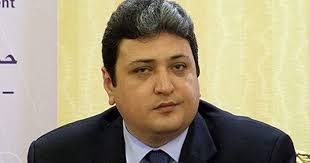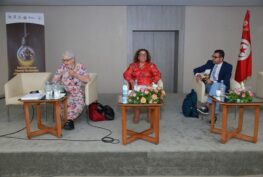Alaa Shalabi, Punitive legislations in Egypt, address at the workshop in Cairo 15/15 May 2017
Secretary General of the Arab Organization for Human Rights
Ladies and gentlemen
At the outset of the national workshop on “Development of the punitive legislations in view of the constitutional entitlements” in the Arab Republic of Egypt, I would like to convey the thanks and appreciation of my colleagues, members of the board of trustees of the Arab Organization for Human Rights and their aspirations related to the success of the development and prosperity process in Egypt and building a society based on the principles of justice, freedom and dignity. This is a key issue in the turbulent Arab world that is looking forward to Egypt to provide an example to be followed in the field of development and freedoms to confirm the pioneering role of Egypt in the region in leading it towards achieving progress and peace and working on helping the region to get out of its tough crises and the vicious circle of violence.
The safeguards related to the punitive legislations in Egypt are among the main interests of the state and community in Egypt in view of the efforts exerted to combat terrorism and its horrendous impact on stability, social peace and the development process. It is evident that the sustainability of the development process is strongly linked to the efforts exerted to uphold punitive legislations in Egypt, guarantee criminal justice and respond to human rights stipulated by the constitution. Establishing the rule of law, transparency, accountability and guaranteeing freedoms represent a strong foundation for good governance and sustainable development, leading to an environment conducive for national and foreign investments, fast litigation and meeting the requirements of the fast justice.
Ladies and gentlemen
The proceedings of this workshop are synchronous with the strenuous efforts exerted by the government and the House of Representatives to expedite the issuance of several basic legislations to activate the constitution as well as other priority laws. This is stressed by the presidential decree relevant to re-formation of the “Supreme Committee of Legislative Reforms” which was issued a few days ago. While this positive legislative movement has been anticipated for a long time to meet the desired aspirations of activating the constitution, we should also refer to some legislative responses to emergency challenges due to their significance and seriousness that should not deviate us from the track stipulated by the constitution which is not just drawn by provisions but it was also drawn by the spirit of the constitution and the strong public support it received in January 2014.
The decisive commitment by the constitution to the international norms of human rights does not only emanate from our respect of the international commitments, but it also emanates from its importance for the country, it meets public demands, it provides proper controls and tools for addressing lots of challenges and boosts national cohesion which is necessary to face various challenge including terrorism.
Ladies and gentlemen
Serious and honest human rights reports reflect key concerns that require conducting urgent legislative reforms, including the death sentence, implementation of the temporary detention procedures, improving the living conditions in prisons and primary detention facilities, confronting all forms of maltreatment and torture, and rehabilitating the prisoners for reintegrating them into the society.
Studies conducted by the Arab Organization for Human Rights on the whole Arab region revealed shocking results including the fact that Egypt, for instance, has around 100 legislative provisions leading to the death sentence. In addition to the applications referring to the challenges resulting from the excessive use of the death sentence, a few applications contributed to creating a negative image that exceeded reality, and did not reflect the efforts exerted including those exerted by the well-established court of appeal and the role played by the Grand Mufti and the presidency in limiting the implementation of the death penalty. There is still a huge responsibility to be shouldered by the government and the House of Representatives to limit the implementation of the death penalty as much as possible in a way that relieves the burden laid on the criminal courts related to implementing this penalty as the consequent results are irreversible.
This workshop coincides with the revelation of important news about a new draft law approved by the government in amendment of the punitive legislation in Egypt and criminal procedures. It is a draft law that included significant amendments and rich additions that satisfy the majority of demands and suggestions especially the two-part proceedings in criminal cases as stipulated by the constitution; inevitable unanimity in issuing a death sentence; emphasis of the exceptional nature of using temporary detention procedures as a preventive measure to reduce this usage; and the right of detainees to compensation if proven innocent.
Still, we hope to improve this draft law through discussions and consultations in the House of Representatives to enhance the procedural safeguards regarding key penalties including death sentence, life sentence, and rigorous imprisonment.
In addition, we are looking forward to reviewing the penal code and its various amendments guided by the efforts exerted by the Supreme Committee of Legislative Reforms that held a general conference for the amendment of criminal procedures law in which we had the honour to participate early this year.
Ladies and gentlemen
In conclusion, I would like to extend my thanks to all for the kind participation and attendance of this event. I would like also to extend my thanks to our partners in the international project to limit the application of capital penalty, especially Hands Off Chain, that exerts strenuous efforts on the international level. I would also like to thank the National Council for Human Rights and the Egyptian Organization for Human Rights for the formidable efforts exerted to organize this event, and I appreciate the outcomes of the on-going tripartite partnership for 12 years now.
I wish we would hold effective and fruitful dialogue that would satisfy our future aspirations.
***










No Comments